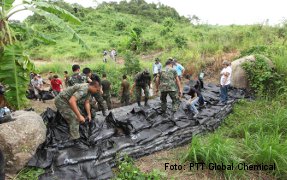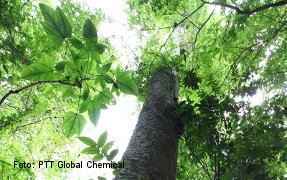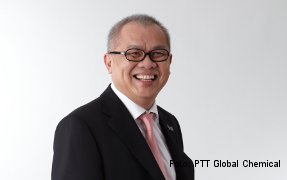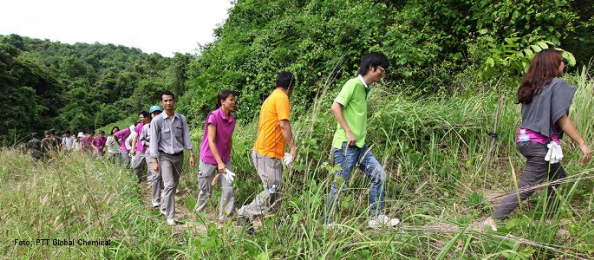The Huay Ma Haad Project
Huay Ma Haad Mountain in Rayong province has lavish natural resources, a wide variety of plants and animals, and it is also the location of main water sources. These resources are important to the surrounding communities, especially the Chak Luk Yha community. For decades, Huay Ma Haad Mountain was on the verge of being completely deforested, which led to water scarcity and greatly affected both the agricultural and industrial sectors in the area and created conflicts between them. As one of Thailand’s leading corporations and a major employer in the Rayong province, PTT Global Chemical (PTTGC) has taken the lead in a regional sustainability initiative, the “Reforestation and Water Conservation at Huay Ma Haad Mountain” project, to strengthen community-led forest conservation, biodiversity restoration, as well as community development.
Together with local communities and environmental experts, PTTGC conducted a study on local species and available natural resources in the area in order to establish proper restoration and development plans. Aiming to sustain this conservation effort, we also established a database to record knowledge and best practices for the benefit of future generations and society at large. The Chak Luk Yha community in particular has been very grateful that the public sector has stepped up to establish this sustainable initiative. Moreover, the will and devotion of the community and employees have been crucial factors in driving the Huay Ma Haad project toward completion. The project is divided into three phases, with three- to five-year intervals between each phase. The first phase was begun in 2010 and will be finished by 2023. The first things taken into account during project development between the community, the government, Kasetsart University, and PTTGC are the community’s requirements, the geographical site and its condition, resource availability, as well as opportunities and business objectives. PTTGC believes that greater engagement with government, communities, and other stakeholders is the key. This way, PTTGC can be certain that the project is suitable for all stakeholders and everybody is engaged in every stage.


Moreover, to expand the abundance of biodiversity on the mountain, several activities are planned each year, for instance planting trees, building dams, and construction to control fires. At the completion of the first phase, we are expecting to observe an increase in plant and animal biodiversity. The project will also bring positive impacts to our employees and local communities, such as unity, friendship, environmental appreciation, and knowledge. Aside from outdoor activities, PTTGC is launching the Phytochemistry Learning Center in the Chak Luk Yha community as a subproject of the Huay Ma Haad project. This will be the first Phytochemistry Learning Center in Thailand. Strategy objectives of the Center are to conserve Huay Ma Haad’s resources and community habitation based on native phytochemistry characteristics; manage the delicate ecosystem; and to maximize resource-knowledge enhancement, for instance regarding herbal remedies, beauty products, foodstuffs, and carved goods.
PTTGC is focusing on the quantitative impacts of its actions by putting measurement systems in place to ensure that the Huay Ma Haad project truly brings positive impacts to the region. With traceable quantitative and qualitative measurement systems in place, the project can demonstrate that it has led to the expansion of reforested areas and the improvement of water conservation through the construction of dams. This indirectly leads to the prevention of wildfires and an increase in plant and animal life. The project will assist in generating the guidelines for sustainable resources and animal biodiversity development in cooperation with local communities. Finally, the project will help in developing natural products and strengthening the community in term of conservation resources and high value-added products from local resources.

PTTGC’s CSR Strategy
For PTTGC, the project has been an opportunity to demonstrate its commitments to its stakeholders and society at large. It has also contributed to better relations and trust between the company and local communities. The company also aims to improve the efficiency of the project by building the capacities of the people involved and seeking collaborations with more partners.
| Initiator | PTT Global Chemical (PTTGC) |
| Project start | 2010 |
| Status | Ongoing |
| Region | Thailand, Rayong province |
| Contact person | CSR Strategy Management |
| Awards |
Project benefit
- Supporting local reforestation and water conservation projects
- Building trust between PTTGC and local communities
| Anti-Corruption | - |
| Business & Peace | - |
| Development | - |
| Environment | X |
| Financial Markets | - |
| Implementing UNGC Principles in your Corporate CSR Management | - |
| Human Rights | - |
| Labour Standards | - |
| Local Networks | X |
| Advocacy of global issues | - |
| Business opportunities in low income communities/countries | - |
| Project funding | X |
| Provision of goods | - |
| Provision of services/personal | X |
| Standards and guidelines development | - |
- Local communities and partner in Rayong province, Thailand
PTT Global Chemical Public Company Limited, or PTTGC, is PTT Group’s petrochemical flagship. We are committed to strengthening our leading position in the chemicals business by combining environmentally-friendly innovations with advanced technologies to develop products to improve people’s lives.
PTTGC is comprised of diversified and comprehensive petrochemical businesses, including manufacturing and distribution of upstream, intermediate, and downstream petrochemical products.
These products can be converted into other chemical products and serve as basic feedstock for downstream industries such as packaging, apparel, communications and electronic equipment, electrical appliances, vehicles, construction materials, engineering-based plastics, agricultural equipment, and much more. These products are not only part of our everyday lives – they also improve the way we live.
PTT Global Chemical – Better chemistry for better living
Source: PTT Global Chemical homepage
Write a comment about this page
Your comments are provided by your own free will and you take sole responsibility for any direct or indirect liability. In order to maintain the highest discussion quality, all comments will be reviewed by our editors. You hereby provide us with an irrevocable, unlimited, and global license for no consideration to use, reuse, delete or publish comments in accordance with our Community Guidelines.
About Us // Privacy Policy // Copyright Information // Legal Disclaimer // Contact
Copyright © 2012-2018 macondo publishing GmbH. All rights reserved.
The CSR Academy is an independent learning platform of the macondo publishing group.









